Improving mental recovery is essential for athletes seeking enhanced performance and emotional stability. This article explores effective strategies, including structured recovery routines and mindfulness practices. It highlights unique techniques such as visualization and cognitive behavioral strategies. Additionally, it addresses common mistakes that hinder mental recovery and offers actionable tips for optimal well-being.
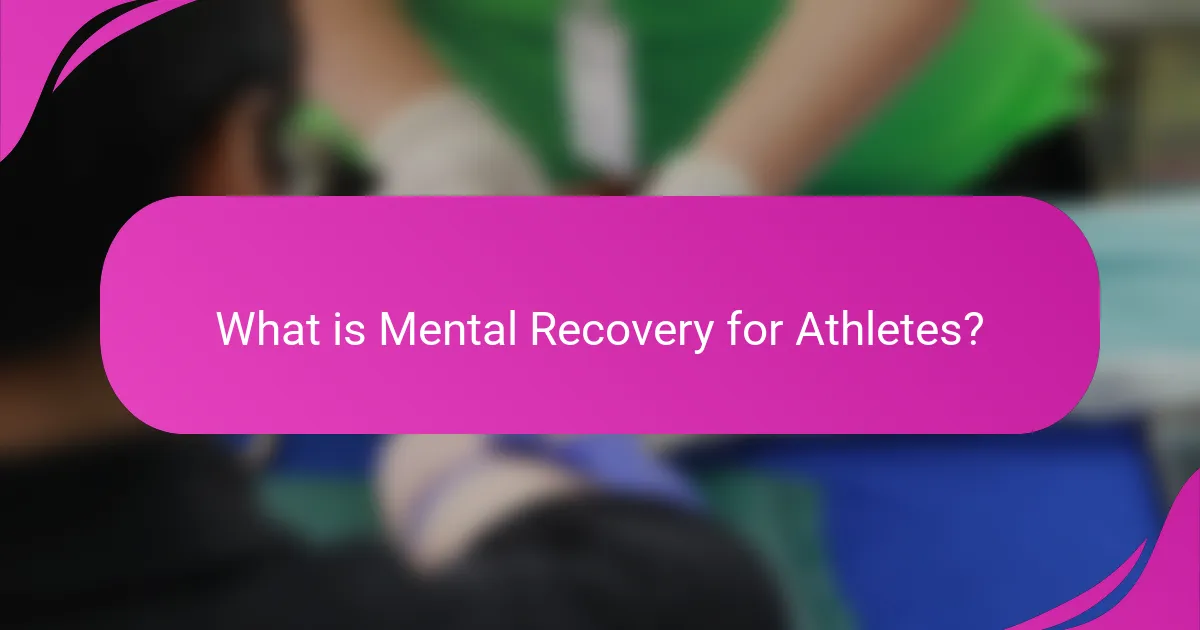
What is Mental Recovery for Athletes?
Mental recovery for athletes involves strategies to restore mental well-being after physical exertion. Techniques such as mindfulness, visualization, and adequate rest enhance focus and resilience. Benefits include improved performance, reduced anxiety, and better emotional regulation. Prioritizing mental recovery leads to long-term athletic success.
Why is Mental Recovery Important in Sports?
Mental recovery is crucial in sports as it enhances performance, reduces burnout, and promotes overall well-being. Effective mental recovery strategies include mindfulness, visualization, and adequate rest. For instance, mindfulness can lower stress levels, while visualization techniques improve focus and confidence. Athletes who prioritize mental recovery experience heightened resilience and improved decision-making during competitions. Implementing these techniques creates a sustainable approach to athletic performance.
How Does Mental Fatigue Affect Athletic Performance?
Mental fatigue significantly impairs athletic performance by reducing focus, decision-making, and physical output. Athletes experiencing mental fatigue may struggle with motivation and resilience, leading to decreased training effectiveness and increased risk of injury. Effective mental recovery strategies, such as mindfulness, adequate rest, and cognitive training, can enhance performance by restoring mental clarity and energy. These techniques not only improve focus but also facilitate better emotional regulation, essential for high-pressure situations in sports.
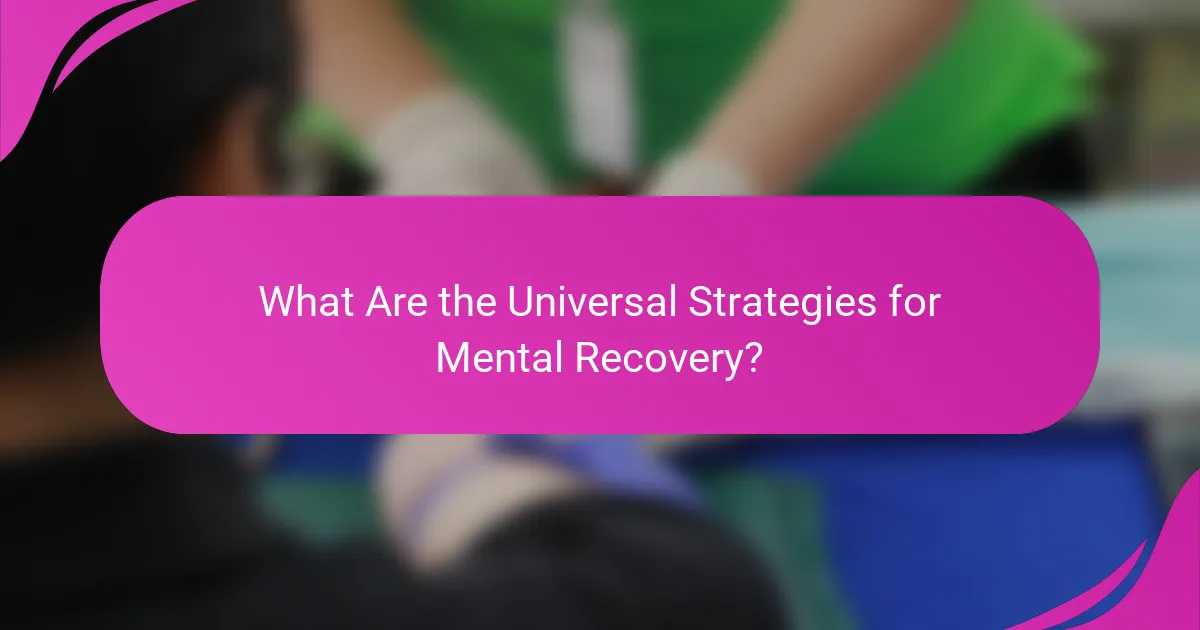
What Are the Universal Strategies for Mental Recovery?
To improve mental recovery for athletes, focus on strategies that enhance resilience and well-being. Key strategies include structured recovery routines, mindfulness practices, and adequate sleep. These techniques foster mental clarity and emotional stability.
Structured recovery routines involve regular rest days, hydration, and nutrition, which collectively support mental health. Mindfulness practices, such as meditation and visualization, can reduce anxiety and improve focus. Prioritizing sleep ensures the brain recharges, enhancing cognitive function and mood regulation.
The benefits of these strategies manifest in improved performance, reduced stress, and better overall mental health. Athletes who adopt these practices report higher levels of motivation and satisfaction in their sports.
How Can Sleep Improve Mental Recovery?
Sleep significantly enhances mental recovery for athletes by improving cognitive function and emotional resilience. Adequate rest facilitates memory consolidation, reduces stress, and boosts overall mood. Research indicates that athletes who prioritize sleep experience faster recovery times and better performance. For instance, a study found that increased sleep duration correlates with improved reaction times and decision-making abilities. Prioritizing sleep as a unique attribute in recovery strategies can lead to substantial benefits in athletic performance.
What Role Does Nutrition Play in Mental Recovery?
Nutrition plays a crucial role in mental recovery for athletes by enhancing cognitive function and emotional well-being. A balanced diet rich in omega-3 fatty acids, antioxidants, and vitamins supports brain health. For instance, omega-3s found in fish improve mood and reduce anxiety. Additionally, hydration is vital; even mild dehydration can impair concentration and increase fatigue. Consuming complex carbohydrates stabilizes blood sugar levels, promoting sustained energy and focus. Ultimately, proper nutrition optimizes recovery, leading to improved performance and resilience.
How Can Relaxation Techniques Aid Recovery?
Relaxation techniques significantly aid recovery for athletes by reducing stress and promoting mental clarity. Techniques such as deep breathing, meditation, and progressive muscle relaxation enhance focus and lower anxiety levels. As a result, athletes experience improved performance and faster recovery times. Studies show that incorporating these methods can lead to a 30% reduction in perceived stress, enabling athletes to recover more effectively from physical exertion.
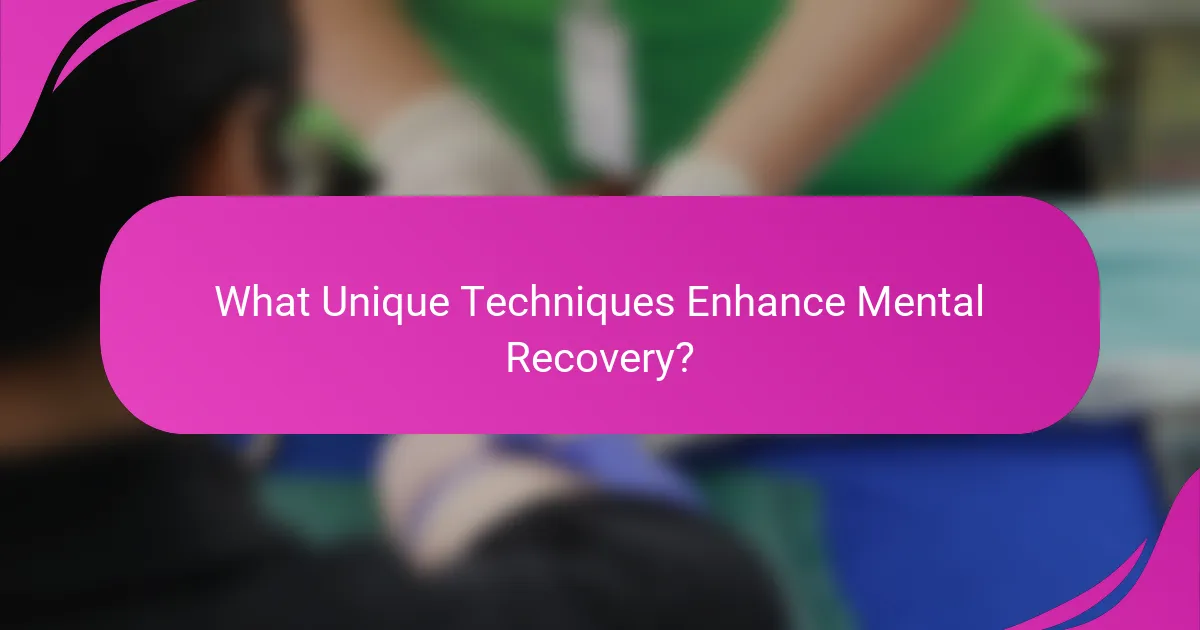
What Unique Techniques Enhance Mental Recovery?
Unique techniques that enhance mental recovery for athletes include mindfulness meditation, visualization practices, and cognitive behavioral strategies. Mindfulness meditation reduces stress and improves focus, while visualization techniques help athletes mentally rehearse performance. Cognitive behavioral strategies promote positive thinking and resilience, essential for overcoming mental barriers. These methods collectively foster a holistic approach to mental recovery, enhancing overall athletic performance.
How Does Visualization Impact Mental Recovery?
Visualization significantly enhances mental recovery for athletes by fostering a positive mindset and reducing anxiety. This technique allows athletes to mentally rehearse successful performances, which can lead to improved confidence and focus. Research indicates that athletes who regularly practice visualization experience faster recovery times and a stronger connection to their physical training. By incorporating visualization into their recovery routines, athletes can achieve better mental resilience and overall performance.
What Is the Role of Mental Conditioning in Recovery?
Mental conditioning plays a crucial role in recovery by enhancing an athlete’s mental resilience and focus. It involves techniques like visualization, mindfulness, and positive self-talk, which help athletes manage stress and anxiety. These strategies improve recovery outcomes by fostering a positive mindset, promoting relaxation, and reducing the perception of pain. As a result, athletes can return to peak performance more effectively and efficiently.
How Can Mindfulness Practices Benefit Athletes?
Mindfulness practices can significantly enhance mental recovery for athletes by improving focus and reducing stress. These techniques foster a greater awareness of the body and mind, leading to improved performance and resilience. Regular mindfulness training can decrease anxiety and enhance emotional regulation, which are crucial for athletes facing high-pressure situations. Studies indicate that athletes who engage in mindfulness report better recovery experiences and higher satisfaction with their performance.
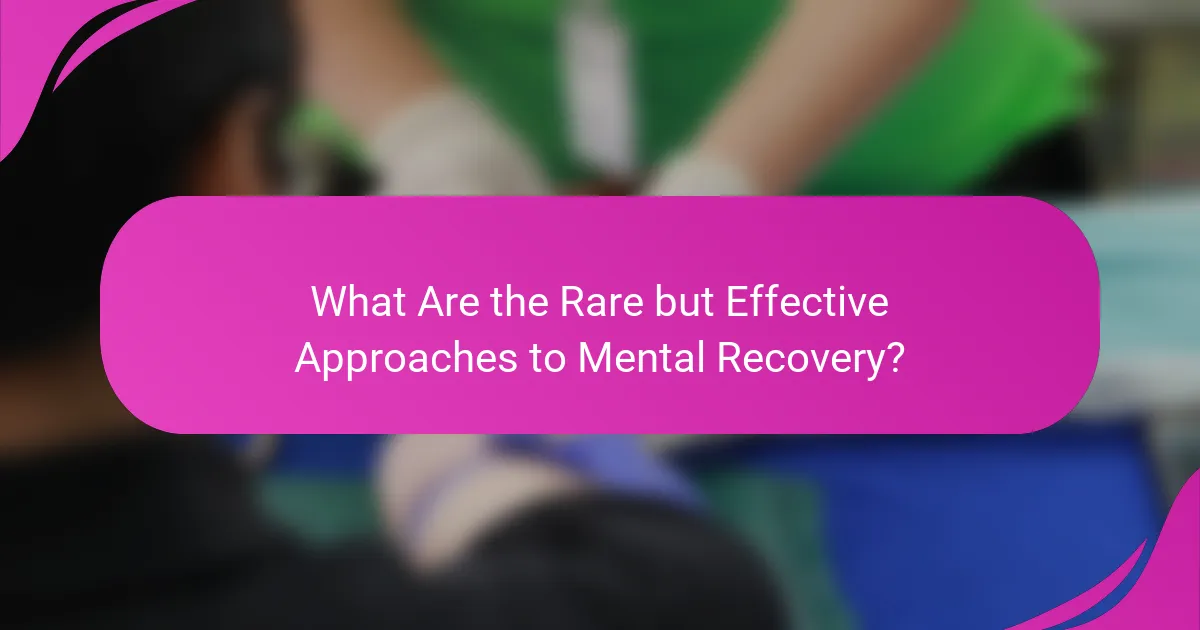
What Are the Rare but Effective Approaches to Mental Recovery?
Effective approaches to mental recovery for athletes include mindfulness techniques, cognitive behavioral therapy, and visualization strategies. These methods enhance focus, reduce anxiety, and improve overall mental resilience. Mindfulness practices, such as meditation, foster awareness and emotional regulation. Cognitive behavioral therapy targets negative thought patterns, promoting healthier mental frameworks. Visualization techniques help athletes mentally rehearse performance, boosting confidence and reducing stress. Each approach contributes uniquely to mental recovery, offering athletes rare yet effective tools for optimal performance.
How Can Neurofeedback Training Support Recovery?
Neurofeedback training significantly enhances mental recovery for athletes by optimizing brain function. This technique uses real-time feedback to help individuals regulate their brain activity, leading to improved focus, reduced anxiety, and enhanced emotional resilience. Research indicates that athletes who engage in neurofeedback training experience faster recovery times and better performance under pressure. As a result, incorporating this method into recovery strategies can yield substantial benefits, including increased mental clarity and reduced stress levels.
What Innovations in Technology Are Available for Mental Recovery?
Innovations in technology for mental recovery include virtual reality, biofeedback, and mobile apps. These tools enhance athletes’ mental resilience and recovery processes.
Virtual reality immerses athletes in calming environments, reducing anxiety and stress. Biofeedback devices monitor physiological responses, helping athletes gain control over their mental state. Mobile apps provide guided meditations and mental training exercises, improving focus and relaxation.
These technologies facilitate personalized recovery strategies, making mental recovery more effective and accessible for athletes.
How Do Team Dynamics Influence Mental Recovery?
Team dynamics significantly enhance mental recovery by fostering a supportive environment. Effective communication, trust, and collaboration among team members contribute to reduced stress and improved emotional well-being. Research shows that athletes in cohesive teams experience faster recovery due to shared experiences and encouragement. Moreover, positive team interactions can lead to increased motivation and resilience, crucial for mental recovery.
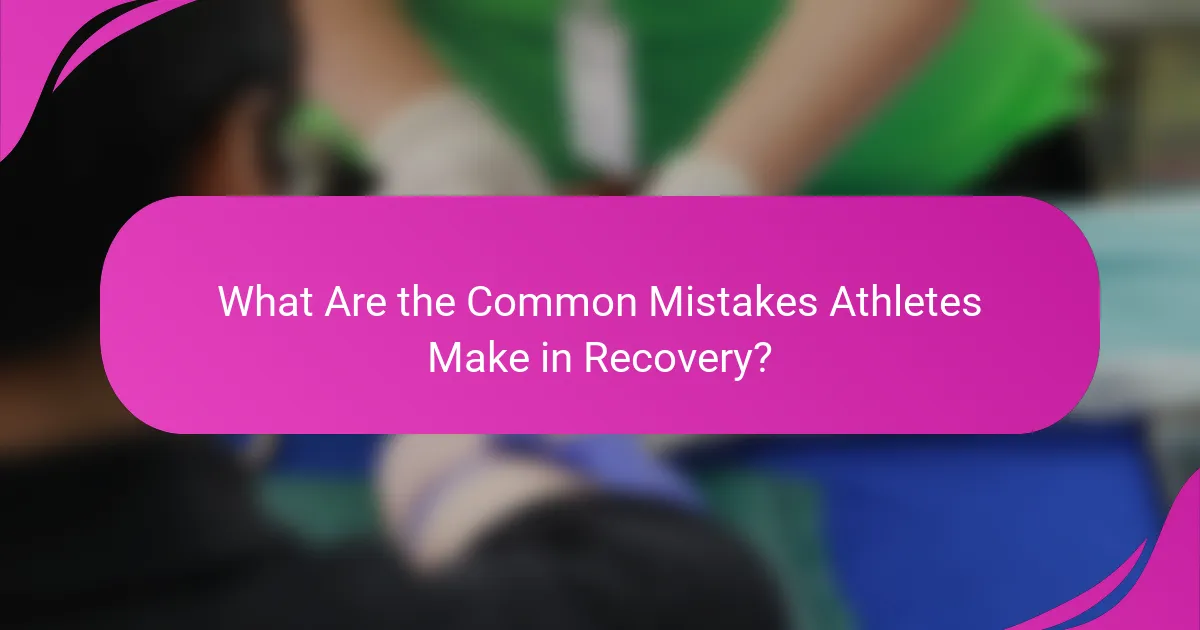
What Are the Common Mistakes Athletes Make in Recovery?
Athletes often make mistakes in recovery that hinder their performance. Common errors include neglecting mental recovery, underestimating rest, and failing to hydrate properly.
Mental recovery is crucial; athletes should incorporate techniques like mindfulness and visualization. These strategies enhance focus and reduce anxiety, ultimately improving performance.
Another mistake is not listening to their bodies. Athletes should recognize fatigue signals and adjust their recovery accordingly. Ignoring these signs can lead to overtraining and injuries.
Lastly, inconsistent recovery routines can disrupt progress. Establishing a structured recovery plan helps athletes maintain optimal performance levels and promotes overall well-being.
How Can Overtraining Affect Mental Recovery?
Overtraining can significantly hinder mental recovery for athletes by increasing stress and anxiety levels. The psychological effects of overtraining include mood swings, decreased motivation, and impaired concentration. These factors can lead to burnout and hinder athletic performance. To mitigate these effects, athletes should incorporate rest, mindfulness techniques, and balanced training schedules. Prioritizing mental recovery enhances overall performance and well-being.
What Misconceptions Exist About Mental Recovery Techniques?
Many misconceptions about mental recovery techniques hinder athletes’ progress. One common myth is that mental recovery is less important than physical recovery, which can lead to neglecting mental health strategies. Another misconception is that these techniques require extensive time, whereas short, focused practices can be highly effective. Some believe that only certain athletes benefit from mental recovery techniques, but research shows that all athletes can enhance performance through mental strategies. Lastly, there is a notion that mental recovery is solely about relaxation; in reality, it encompasses various techniques, including visualization, mindfulness, and cognitive restructuring.
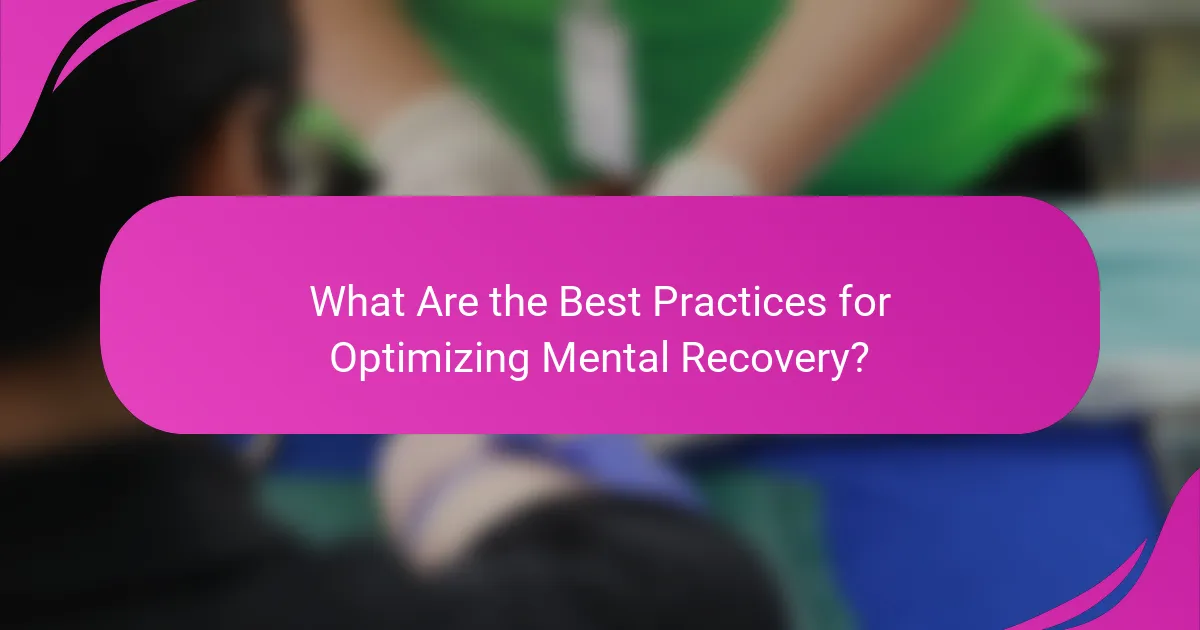
What Are the Best Practices for Optimizing Mental Recovery?
To optimize mental recovery for athletes, implement structured strategies that enhance rest and rejuvenation. Prioritize sleep hygiene, incorporating consistent sleep schedules and a restful environment. Utilize mindfulness techniques, such as meditation and deep breathing, to reduce stress and improve focus. Engage in active recovery through light physical activity to promote blood flow and mental clarity. Foster social connections with teammates or support groups to enhance emotional well-being.
How Can Athletes Create a Personalized Recovery Plan?
Athletes can create a personalized recovery plan by assessing their individual needs and preferences. Key strategies include setting specific recovery goals, incorporating mental techniques such as visualization and mindfulness, and scheduling regular check-ins to adjust the plan. Research shows personalized recovery enhances performance and reduces injury risk. Benefits include improved mental resilience, better stress management, and enhanced focus. Tailoring recovery to unique attributes fosters a more effective approach to overall athletic performance.
What Tips Can Coaches Provide to Support Mental Recovery?
Coaches can support mental recovery by implementing strategies that enhance athletes’ resilience and well-being. Techniques include fostering open communication, encouraging mindfulness practices, and emphasizing the importance of rest.
1. Promote open dialogue about mental health challenges.
2. Incorporate mindfulness exercises to reduce stress.
3. Encourage regular breaks to prevent burnout.
4. Set realistic goals to maintain motivation.
5. Provide positive reinforcement to build confidence.
6. Educate athletes on the benefits of mental recovery techniques.
How Can Regular Assessment Improve Recovery Strategies?
Regular assessment significantly enhances recovery strategies for athletes by identifying strengths and weaknesses. This process allows for tailored interventions, ensuring that recovery plans are effective and responsive to individual needs. Regular assessments can reveal progress metrics, helping athletes stay motivated and focused on their recovery goals. Furthermore, they facilitate adjustments in techniques and strategies, optimizing recovery time and improving overall performance. Consistent evaluation also fosters accountability, encouraging athletes to adhere to their recovery regimens.